Wp/grc/Οὐικιπαιδεία:Δέλτοι ἅσπερ δεῖ τὴν Ἑλληνικὴν Οὐικιπαιδείαν περιέχειν
Appearance
βιογραφίαι
[edit | edit source]- People in ancient Greece
Φιλόσοφοι
[edit | edit source]- List of ancient Greek philosophers
- Ἀναξαγόρας
- Ἀναξίμανδρος
- Ἀναξιμένης
- Ἀντισθένης
- Aristotle
- Δημόκριτος
- Διογένης
- Ἐμπεδοκλῆς
- Ἐπίκουρος
- Γοργίας
- Ἡράκλειτος
- Hypatia
- Leucippus
- Parmenides
- Plato
- Protagoras
- Pythagoras
- Socrates
- Thales
- Zeno
Μουσικοί
[edit | edit source]- Aglais (musician)
- Aristocleides
- Cynaethus
- Epigonus of Ambracia
- Hedea of Tralles
- Herodorus of Megara
- Lamprus of Erythrae
- Lasus of Hermione
- Melanippides
- Pericleitus
- Philotas (musician)
- Phrynnis
- Simonides of Ceos
- Stratonice of Pontus
- Stratonicus of Athens
- Terpander
- Thaletas
- Timotheus of Miletus
Μαθηματικοί
[edit | edit source]- Aristarchus
- Autolycus
- Philo of Byzantium
- Biton
- Apollonius
- Archimedes
- Euclid
- Theodosius
- Hypsicles
- Athenaeus
- Geminus
- Hero
- Apollodorus
- Theon of Smyrna
- Cleomedes
- Nicomachus
- Ptolemy
- Gaudentius
- Anatolius
- Aristides Quintilian
- Porphyry
- Diophantus
- Alypius
- Damianus
- Pappus
- Serenus
- Theon of Alexandria
- Anthemius
- Eutocius
Κατάλογοι γραφέων
[edit | edit source]- Astronomers
- Geographers
- Historians
- Mathematicians
- Philosophers
- Playwrights
- Poets
- Seven Sages
- Writers
Κεραμική
[edit | edit source]- Painter of Acropolis 606
- Affecter
- Amasis Painter
- Anagyrus Painter
- Anakles
- Arkesilas Painter
- Athena Painter
- Antimenes Painter
- Beldam Painter
- Bellerophon Painter
- Painter of Berlin A 34
- Painter of Berlin 1686
- BMN Painter
- Burgon Group
- C Painter
- Castellani Painter
- Cerameicus Painter
- Chimera Painter
- Class of Cabinet des Médailles 218
- Columbus Painter
- Daybreak Painter
- Diosphos Painter
- Dodwell Painter
- Duel Painter
- Edinburgh Painter
- Elbows Out
- Euphiletos Painter
- Gela Painter
- Goltyr Painter
- Gorgon Painter
- Haimon Painter
- Heidelberg Painter
- Horse-bird Painter
- Hypobibazon Class
- Kabiria Group
- Kassandra Painter
- Kleitias
- Lion Painter
- Lydos
- Lysippides Painter
- Madrid Painter
- Mastos Painter
- Painter of Munich 1410
- N Painter
- Naucratis Painter
- Nearchos
- Nessos Painter
- Painter of Nicosia Olpe
- Nikoxenos Painter
- Northampton Group
- Oxford Palmette Class
- Painter of Palermo 489
- Panther Painter
- Perizoma Group
- Pholoe Painter
- Phrynos Painter
- Piraeus Painter
- Polos Painter
- Pontic Group
- Priam Painter
- Princeton Painter
- Psiax
- Ptoon Painter
- Rider Painter
- Rycroft Painter
- Sappho Painter
- Sophilos
- Swing Painter
- Taleides Painter
- Theseus Painter
- Three Line Group
- Tityos Painter
- Tydeus Painter
- Xenokles Painter
- Achilles Painter
- Aison
- Altamura Painter
- Amykos Painter
- Andokides painter
- Antiphon Painter
- Apollodoros
- Aristophanes
- Asteas
- Baltimore Painter
- Berlin Painter
- Painter of the Berlin Dancing Girl
- Brygos Painter
- Bryn Mawr Painter
- Chrysis Painter
- Codrus Painter
- Darius Painter
- Dinos Painter
- Dokimasia Painter
- Douris
- Eretria Painter
- Eucharides Painter
- Foundry Painter
- Harrow Painter
- Hasselmann Painter
- Hermonax
- Ilioupersis Painter
- Jena Painter
- Kerch style
- Kleophon Painter
- Kleophrades Painter
- Makron
- Marsyas Painter
- Meidias Painter
- Meleager Painter
- Niobid Painter
- Onesimos
- Oreithyia Painter
- Pamphaios
- Penthesilea Painter
- Persephone Painter
- Phiale Painter
- Pisticci Painter
- Pistoxenos Painter
- Polygnotos
- Providence Painter
- Reed Painter
- Shuvalov Painter
- Siren Painter
- Sisyphus Painter
- Skythes
- Snub-nose Painter
- Tarporley Painter
- Tarquinia Painter
- Tithonos Painter
- Triptolemos Painter
- Underworld Painter
- Varrese Painter
- Painter of the Vatican Mourner
- Villa Giulia Painter
- Wedding Painter
- YZ Group
Γραφεῖς
[edit | edit source]- Αἰσχύλος
- Αἴσωπος
- Ἀλκαῖος
- Ἀρχίλοχος
- Ἀριστοφάνης
- Βακχυλίδης
- Eὐριπίδης
- Ἡρόδοτος
- Ἡσίοδος
- Hipponax
- Homer
- Ibycus
- Lucian
- Menander
- Mimnermus
- Panyassis
- Philocles
- Pindar
- Plutarch
- Polybius
- Sappho
- Simonides
- Sophocles
- Stesichorus
- Theognis
- Thucydides
- Timocreon
- Tyrtaeus
- Xenophon
Ἄρχοντες
[edit | edit source]- Kings of Argos
- Archons of Athens
- Kings of Athens
- Kings of Commagene
- Diadochi
- Kings of Macedonia
- Kings of Paionia
- Attalid kings of Pergamon
- Kings of Pontus
- Ptolemaic dynasty
- Seleucid dynasty
- Kings of Sparta
- Tyrants of Syracuse
Γεωγράφοι
[edit | edit source]- Pre-Hellenistic Classical Greece


- Homer
- Anaximander (died Template:Wp/grc/Circa)
- Hecataeus of Miletus (died Template:Wp/grc/Circa)
- Massaliote Periplus (6th century BC)
- Scylax of Caryanda (6th century BC)
- Herodotus (died Template:Wp/grc/Circa)
- Hellenistic period
- Pytheas (died Template:Wp/grc/Circa)
- Periplus of Pseudo-Scylax (3rd or 4th century BC)
- Megasthenes (died Template:Wp/grc/Circa)
- Autolycus of Pitane (died Template:Wp/grc/Circa)
- Dicaearchus (died Template:Wp/grc/Circa)
- Deimakos (3rd century BC)
- Timosthenes (fl. 270s BC)
- Eratosthenes (c. 276-194 BC)
- Scymnus (fl. 180s BC)
- Hipparchus (c. 190-120 BC)
- Agatharchides (2nd century BC)
- Posidonius (c. 135-51 BC)
- Pseudo-Scymnus (c. 90 BC)
- Diodorus Siculus (c. 90-30 BC)
- Alexander Polyhistor (1st century BC)
- Roman Empire period Template:Wp/grc/Anchor

- Periplus of the Erythraean Sea
- Strabo (64 BC - 24 AD)
- Pomponius Mela (fl. 40s AD)
- Isidore of Charax (1st century AD)
- Mucianus (1st century AD)
- Pliny the Elder (23-79 AD), Natural History
- Marinus of Tyre (c. 70–130)[1]
- Ptolemy (90-168), Geography
- Pausanias (2nd century)
- Agathedaemon of Alexandria (2nd century)
- Dionysius of Byzantium (2nd century)
- Agathemerus (3rd century)
- Tabula Peutingeriana (4th century)
- Alypius of Antioch (4th century)
- Marcian of Heraclea (4th century)
- Expositio totius mundi et gentium (AD 350–362)
- Julius Honorius (very uncertain: 4th, 5th or 6th century)
- Byzantine Empire
- Hierocles (author of Synecdemus) (6th century)
- Cosmas Indicopleustes (6th century)
- Stephanus of Byzantium (6th century)
Ἱστοριογράφοι
[edit | edit source]Archaic Greece
[edit | edit source]- Acusilaus
- Amelesagoras
- Cadmus of Miletus
- Hecataeus of Miletus
- Hellanicus of Lesbos
- Pherecydes of Athens
- Stesimbrotos of Thasos
- Xanthus (historian)
Classical Greece
[edit | edit source]- Antiochus of Syracuse
- Callisthenes
- Cratippus of Athens
- Ctesias
- Dinon
- Duris of Samos
- Ephorus
- Eudemus of Rhodes
- Hellanicus of Lesbos
- Heracleides of Cyme
- Herodotus
- Philistus
- Theopompus
- Thucydides
- Xenophon
- Hellenica Oxyrhynchia
Hellenistic Greece
[edit | edit source]- Abydenus
- Aesopus (historian)
- Agatharchides
- Agathocles (writers)
- Alexander Polyhistor
- Anticlides
- Antipater
- Antisthenes of Rhodes
- Aratus of Sicyon
- Artapanus of Alexandria
- Berossus
- Callixenus of Rhodes
- Cleitarchus
- Craterus (historian)
- Ctesicles
- Deinias of Argos
- Demetrius the Chronographer
- Diyllus
- Duris of Samos
- Euphantus
- Eupolemus
- Hecataeus of Abdera
- Hegesander (historian)
- Hegesias of Magnesia
- Hippobotus
- Jason of Cyrene
- Leon of Pella
- Manetho
- Marsyas of Pella
- Marsyas of Philippi
- Menander of Ephesus
- Neanthes of Cyzicus
- Nicander
- Paeon of Amathus
- Palaephatus
- Philinus of Agrigentum
- Philochorus
- Philostephanus
- Phylarchus
- Polybius
- Posidonius
- Satyrus the Peripatetic
- Sosicrates
- Theopompus
- Timaeus (historian)
Roman Greece
[edit | edit source]- Gaius Acilius
- Acesander
- Alexander Lychnus
- Alexander Polyhistor
- Appian
- Arrian
- Zarmanochegas
- Caecilius of Calacte
- Callinicus (Sophist)
- Castor of Rhodes
- Dio Chrysostom
- Lucius Cincius Alimentus
- Criton of Heraclea
- Criton of Pieria
- Dexippus
- Cassius Dio
- Diocles of Peparethus
- Diodorus Siculus
- Dionysius of Halicarnassus
- Ephorus the Younger
- Herodian
- Hypsicrates (historian)
- Josephus
- Sextus Julius Africanus
- Memnon of Heraclea
- Nicias of Nicaea
- Nicolaus of Damascus
- Pamphile of Epidaurus
- Philo of Byblos
- Plutarch
- Polyaenus
- Polybius
- Posidonius
- Gaius Asinius Quadratus
- Strabo
- Thallus (historian)
- Theophanes of Mytilene
Byzantine Empire
[edit | edit source]Φιλοσοφία
[edit | edit source]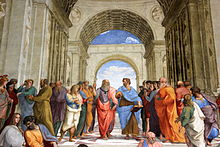
Ἐν φιλοσοφίᾳ προαιρέσεις
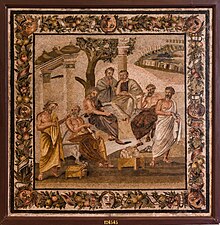
- Classical Greek
- Hellenistic

Σχολαστικὴ φιλοσοφία
[edit | edit source]Θρησκεία
[edit | edit source]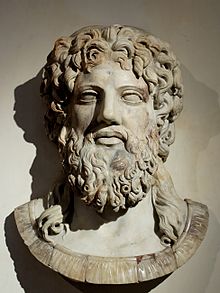


- Twelve Olympians
- Greek mythology
- Religious practices
- Ancient Greek religious titles (priests)
- Hellenistic religion
Χριστιανισμός
- History of the Eastern Orthodox Church
- Timeline of Eastern Orthodoxy in Greece (33–717)
- Timeline of Eastern Orthodoxy in Greece (717–1204)
- Timeline of Eastern Orthodoxy in Greece (1204–1453)
- Christianity in the 1st century
- First seven ecumenical councils
- Εἰκονομαχία
Μυθολογία
[edit | edit source]Θεοί
[edit | edit source]Ἥρωες
[edit | edit source]- Heracles
- Achilles
- Hector
- Odysseus
- Jason
- Argonauts
- Perseus
- Oedipus
- Orpheus
- Theseus
- Bellerophon
- Daedalus
- Atalanta
- Hippomenes
- Cadmus
- Aeneas
- Phaethon
- Triptolemus
- Pelops
- Pirithous
- Amphitryon
- Narcissus
- Meleager
- Otrera
Ἄλλα μυθικὰ θηρία
[edit | edit source]Γλῶσσα
[edit | edit source]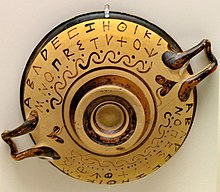
- Ancient Greek
- Ancient Greek dialects
- Ancient Greek grammar
- Ancient Greek phonology
- Greek alphabet
- Greek diacritics
- Greek inscriptions
- Greek Numbers
- Greek numerals
- Greek orthography
- Greek phrases
- Greek verbs
- Greek words for love
Γράμματα
[edit | edit source]- General
- Geography
- Periplus of the Erythraean Sea
- Ἑλλάδος Περιήγησις
- Γεωγραφικὴ Ὑφήγησις
- Ἰνδικά (Μεγασθένης)
- Ἰνδικά (Κτησίᾱς)
- Γεωγραφικά
- Περὶ τῶν τοπικῶν ὀνομάτων τῶν ἐν τῇ Θείᾳ Γραφῇ
- Περὶ σφαίρας καὶ κυλίνδρου
- Περὶ ἑλίκων
- Περὶ κωνοειδέων καὶ σφαιροειδέων
- Astronomy
- Μαθηματικὴ Σύνταξις
- Τετραγωνισμὸς παραβολῆς
- Κύκλου μέτρησις
- Ἀρχιμήδου Ψαμμίτης
- Ὀστομάχιον
- Στοιχεῖα
- Περὶ μεγεθῶν καὶ ἀποστημάτων [ἡλίου καὶ σελήνης (Ἀρίσταρχος ὁ Σάμιος)
- Περὶ μεγεθῶν καὶ ἀποστημάτων [ἡλίου καὶ σελήνης] (Ἵππαρχος)
- Mathematics
- Τετραγωνισμὸς παραβολῆς
- Ἀριθμητικά
- Ὀπτικά
- Epic poetry
- Ο Ανδρόνικος και ο Μαύρος του
- Ο υιός του Ανδρόνικου
- Το άσμα του Αρμούρη
- Lyric poetry
- Ἀρχίλοχος
- Nine Lyric Poets
- Alcman of Sparta (choral lyric, 7th century BC)
- Sappho of Lesbos (monodic lyric, Template:Wp/grc/Circa BC)
- Alcaeus of Mytilene (monodic lyric, Template:Wp/grc/Circa BC)
- Anacreon of Teos (monodic lyric, 6th century BC)
- Stesichorus of Metauros (choral lyric, 7th century BC)
- Ibycus of Rhegium (choral lyric, 6th century BC)
- Simonides of Ceos (choral lyric, 6th century BC)
- Bacchylides of Ceos (choral lyric, 5th century BC)
- Pindar of Thebes (choral lyric, 5th century BC)
- Drama
- Προμηθεὺς Δεσμώτης
- Ῥῆσος
- Οἰδίπους Τύραννος
- Ἱππόλυτος
- Βάκχαι
- Μήδεια
- Historiography
- Religion
- Philosophy
- Ἀπολογία Σωκράτους
- Φαίδων
- Συμπόσιον
- Πολιτεία
- Heraclitus (Template:Wp/grc/Circa), Fragments
- Parmenides (Template:Wp/grc/Circa), On Nature
- Plato (early period), Crito
- Plato (early period), Euthyphro
- Plato (early period), Gorgias
- Plato (early period), Protagoras
- Plato (early transitional period, Template:Wp/grc/Circa), Cratylus
- Plato (early transitional period), Meno
- Plato (middle period, Template:Wp/grc/Circa), Phaedo
- Plato (middle period), Symposium
- Plato (late transitional period, Template:Wp/grc/Circa), Parmenides
- Plato (late transitional period), Theaetetus
- Plato (late transitional period), Phaedrus
- Plato (late period, Template:Wp/grc/Circa), Laws
- Plato (late period), Timaeus
- Plato (Bk. 1, early period. Bks. 2–10, late period), The Republic
- Aristotle (Template:Wp/grc/Floruit), Organon
- Aristotle, Physics
- Aristotle, Metaphysics
- Aristotle, On the Soul
- Aristotle, Nicomachean Ethics
- Aristotle, Politics
- Aristotle, Rhetoric
- Aristotle, Poetics
- Epicurus, (341 – 270 BC), On Nature
- History
- Church History (Eusebius)
- Histories (Herodotus)
Ἐπιστήμη
[edit | edit source]Ἀστρονομία
[edit | edit source]Ὑγίεια καὶ ἰατρική
[edit | edit source]Μαθηματικά
[edit | edit source]Ἑλληνικά
[edit | edit source]

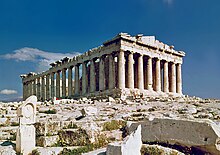
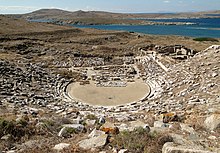

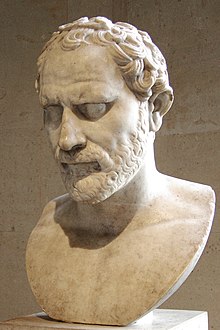
- Ancient Greek calendars
- Clothing in ancient Greece
- Clubs in ancient Greece
- Coinage of ancient Greece
- Cuisine of ancient Greece
- Education in ancient Greece
- Fiction set in ancient Greece
- Greek gardens
- Marriage in ancient Greece
- Sexuality in ancient Greece
- Slavery in ancient Greece
- Women in Classical Athens
Ἀγῶνες
[edit | edit source]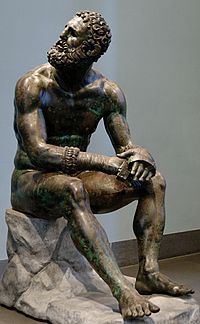
Sports
Equipment
Stadiums
Training facilities
Κοινωνία
[edit | edit source]Οἶκος
[edit | edit source]Πόλις
[edit | edit source]Πλοῦτος
[edit | edit source]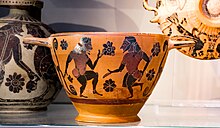
- Economy of ancient Greece
- Agriculture in ancient Greece
- Pottery of ancient Greece
- Slavery in ancient Greece
Νόμος
[edit | edit source]Νομοθέται
[edit | edit source]- Ancient Greek lawmakers
- Draco – first legislator of Athens in Ancient Greece. He replaced the prevailing system of oral law and blood feud by a written code to be enforced only by a court. Draco's written law became known for its harshness, with the adjective "draconian" referring to similarly unforgiving rules or laws.
- Draconian constitution – first written constitution of Athens. So that no one would be unaware of them, they were posted on wooden tablets (ἄξονες – axones), where they were preserved for almost two centuries, on steles of the shape of three-sided pyramids (κύρβεις – kyrbeis).
- Solon – Athenian statesman and lawmaker, remembered for the Solonian Constitution.
- Solonian Constitution – a code of laws embracing the whole of public and private life. It sought to revise or abolish the older laws of Draco.
- Seisachtheia – a set of laws instituted by the Athenian lawmaker Solon in order to rectify the widespread serfdom and slavery that had run rampant in Athens by the 6th century BC, by debt relief.
- Solonian Constitution – a code of laws embracing the whole of public and private life. It sought to revise or abolish the older laws of Draco.
- Draco – first legislator of Athens in Ancient Greece. He replaced the prevailing system of oral law and blood feud by a written code to be enforced only by a court. Draco's written law became known for its harshness, with the adjective "draconian" referring to similarly unforgiving rules or laws.
- Dreros inscription – the earliest surviving inscribed law from ancient Greece.
- Heliaia, the supreme court of ancient Athens.
- Great Rhetra, the constitution of Sparta
Πόλεμος
[edit | edit source]- Wars
- Ancient Greek warfare
- Ancient Macedonian army
- Hoplite
- Phalanx
- Oared vessel tactics
- Title
- Units and formation
- Weapon
- Athenian military
- Antigonid Macedonian army
- Army of Macedon
- Ballista
- Cretan archers
- Hellenistic armies
- Hippeis
- Hoplite
- Hetairoi
- Macedonian phalanx
- Military of Mycenaean Greece
- Phalanx
- Peltast
- Pezhetairos
- Sarissa
- Sacred Band of Thebes
- Sciritae
- Seleucid army
- Spartan army
- Strategos
- Toxotai
- Xiphos
- Xyston
- List of Macedonian military personnel
- Military tactics of Alexander the Great
Ὁ πόλεμος ἐν τῇ ἀρχαίᾳ Ἑλλάδι
[edit | edit source]- Ἡ πολεμικὴ τέχνη ἐν τῇ ἀρχαίᾳ Ἑλλάδι
- Ancient Greek warfare
- Homosexuality in the militaries of ancient Greece
- Military of Mycenaean Greece
Συμμαχίαι καὶ ἡγεμονίαι
[edit | edit source]- Ionian League (started mid-7th century BC)
- 1st Achaean League (formed in 5th century BC)
- Delian League (478–404 BCE)
- Spartan hegemony (431–371 BCE)
- Theban hegemony (371–362 BCE)
- League of Corinth (338–322 BCE)
- Peloponnesian League (6th to 4th century BC)
- Arcadian League (370 to 3rd century BCE)
- 2nd Achaean League (280–146 BCE)
- Aetolian League (4th to 3rd century BCE?)
Πόλεμοι καὶ μάχαι
[edit | edit source]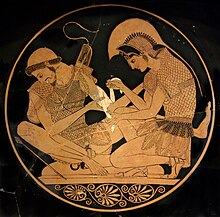
- Trojan War
- Lelantine War
- Messenian Wars
- First Sacred War
- Greco-Persian Wars – series of conflicts between the Achaemenid Empire of Persia and city-states of the Hellenic world that started in 499 BC and lasted until 449 BC.
- First Peloponnesian War
- Sicilian Wars
- Peloponnesian War
- Battle of Arginusae
- Battle of Delium
- Battle of Rhium
- Battle of Sybota
- Battle of Potidaea
- Battle of Naupactus
- Battle of Notium
- Battle of Syme
- Battle of Cynossema
- Battle of Pylos
- Battle of Sphacteria
- Battle of Amphipolis
- Battle of Mantinea (418 BC)
- Battle of Olpae
- Sicilian Expedition
- Battle of Syme
- Battle of Cyzicus
- Battle of Aegospotami
- Corinthian War
- Battle of Coronea (394 BC)
- Battle of Naxos
- Battle of Leuctra
- Battle of Cynoscephalae
- Battle of Mantinea (362 BC)
- March of the 10,000
- Battle of Crocus Field
- Boeotian War
- Foreign War

- Wars of Alexander the Great
- Lamian War
- Wars of the Diadochi
- Chremonidean War
- Battle of Sellasia
- Battle of Cynoscephalae
- Battle of Asculum
- Cretan War
- Macedonian Wars
- Achaean War
Μηχανική
[edit | edit source]- Ancient Greek technology
- List of Greek inventions and discoveries
- List of Byzantine inventions
- Units of measurement in ancient Greece
Τέχναι
[edit | edit source]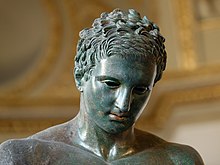
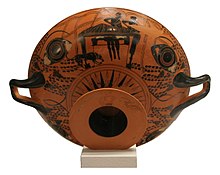
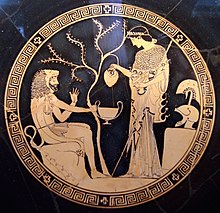
ca. 480–470 BC
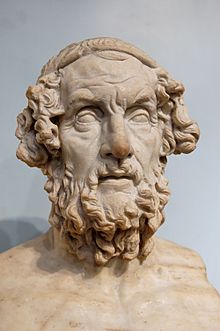
- Death in ancient Greek art
- Music of ancient Greece
- Painting in ancient Greece
- Pottery of ancient Greece
- Sculpture in ancient Greece
- Sport in ancient Greek art
- Theatre of ancient Greece
- Warfare in ancient Greek art
Ἀρχιτεκτονία
[edit | edit source]- Ancient Greek architecture
- Minoan architecture
- Mycenaean architecture
- Ancient Greek architecture (Aeolic/Doric/Ionic/Corinthian order)
- Minoan sites
- Mycenaean sites
- Ancient Greek sites (temples, stoae)
- Knossos Palace
- Lion Gate
- Parthenon
- Macedonian tombs of Vergina
- Grand Master's Palace
- List of Ancient Greek temples
- List of stoae
Architecture of ancient Greece
- Acropolis
- Agora
- Ancient Greek baths
- Delphinion
- Metroon
- Odeon
- Propylaea
- Ancient Greek roofs
- Stoa
- Ancient Greek temple
- Ancient Greek walls
Ἱστοριογραφία καὶ γεωγραφία
[edit | edit source]Χρονογραφία
[edit | edit source]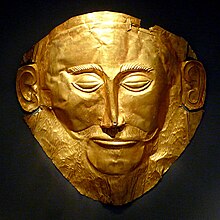
Ἑλληνικὴ ἀρχαιολογία, κατὰ περίοδον
[edit | edit source]- Prehistoric Greek history
- History of ancient Greece (timeline)
Ἑλληνικὴ ἀρχαιολογία, κατὰ χώραν
[edit | edit source]
- Ancient Athens
- Athenian democracy – democracy in the Greek city-state of Athens developed around the fifth century BC, making Athens one of the first known democracies in the world, comprising the city of Athens and the surrounding territory of Attica. It was a system of direct democracy, in which eligible citizens voted directly on legislation and executive bills.
- Solon (c. 638 – c. 558 BC)– Athenian statesman, lawmaker, and poet. Legislated against political, economic, and moral decline in archaic Athens. His reforms failed in the short term, yet he is often credited with having laid the foundations for Athenian democracy.
- Cleisthenes (born around 570 BC). – father of Athenian democracy. He reformed the constitution of ancient Athens and set it on a democratic footing in 508/7 BC.
- Ephialtes (died 461 BC) – led the democratic revolution against the Athenian aristocracy, which exerted control through the Areopagus, the most powerful body in the state. Ephialtes proposed a reduction of the Areopagus' powers, and the Ecclesia (the Athenian Assembly) adopted Ephialtes' proposal without opposition. This reform signaled the beginning of a new era of "radical democracy" for which Athens would become famous.
- Pericles – arguably the most prominent and influential Greek statesman. When Ephialtes was assassinated for overthrowing the elitist Council of the Aeropagus, his deputy Pericles stepped in. He was elected strategos (one of ten such posts) in 445 BCE, which he held continuously until his death in 429 BCE, always by election of the Athenian Assembly. The period during which he led Athens, roughly from 461 to 429 BC, is known as the "Age of Pericles".
- Ostracism – procedure under the Athenian democracy in which any citizen could be expelled from the city-state of Athens for ten years.
- Areopagus – council of elders of Athens, similar to the Roman Senate. Like the Senate, its membership was restricted to those who had held high public office, in this case that of Archon.
- Ecclesia – principal assembly of the democracy of ancient Athens during its "Golden Age" (480–404 BCE). It was the popular assembly, open to all male citizens with 2 years of military service. In 594 BC, Solon allowed all Athenian citizens to participate, regardless of class, even the thetes (manual laborers).
- Athenian democracy – democracy in the Greek city-state of Athens developed around the fifth century BC, making Athens one of the first known democracies in the world, comprising the city of Athens and the surrounding territory of Attica. It was a system of direct democracy, in which eligible citizens voted directly on legislation and executive bills.
- History of Sparta
- History of Macedonia (ancient kingdom)
- History of Crete#Iron Age and Archaic Crete
- Asia Minor#Greek West
- History of Greek and Hellenistic Sicily
- Greeks in pre-Roman Gaul
- Cyrenaica#Greek rule
- Bosporan Kingdom
- Ptolemaic Kingdom
- Coele-Syria
- Seleucid Empire
- Greco-Bactrian Kingdom
- Indo-Greek Kingdom
Γεωγραφία
[edit | edit source]Χῶραι τῆς ἀρχαίας Ἑλλάδος
[edit | edit source]- Regions of ancient Greece
- Peloponnese
- Central Greece
- Thessaly
- Pherae
- Larissa
- Autonomous Subregion
- Magnesia
- Subregions within Thessaly
- Achaea Phthiotis
- Histiaeotis
- Pelasgiotis
- Perrhaebia
- Epirus
- Macedon
- Aegean Sea
- Crete
- Cyprus
- Ionian Sea
- Hellespont
- Sea of Marmara
- Bosphorus
- Asia Minor
- Magna Grecia
- Greek colonies
- ↑ Hubert Cancik and Helmuth Schneider (ed.): "Marinus", Brill's New Pauly, Brill, 2010:
M. of Tyre (Μαρῖνος; Marînos), Greek geographer, 2nd cent. AD
